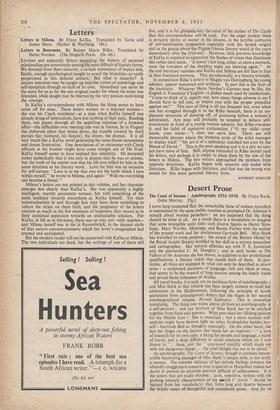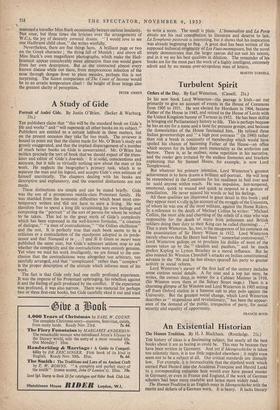Desert Prose
The Coast of Incense : Autobiography 1933-1939. By Freya Stark. (John Murray. 25s.) I HAVE long suspected that the remarkable fame of women travellers is maintained by the same public reaction as prompted Dr. Johnson's remark about women preachers : we are surprised that the thing should be done at all. As a result there is a temptation to imagine that some intangible unity links such diverse figures as Hester Stan- hope, Mary Wortley Montagu, and Rosita Forbes with the author of the present work and her predecessor Gertrude Bell. Miss Stark has travelled to some purpose ; the award of the Burton Medal by the Royal Asiatic Society testified to her skill as a serious researcher and cartographer. Her natural affinities are with T. E. Lawrence and the patriarchal C. M. Doughty ; and in such books as The Valleys of the Assassins she has shown, in addition to her profeslional qualifications, a literary talent that recalls both of them. In par- ticular, all three are stamped by what can only be described as desert prose : a sculptured precision of language, rich and bleak at once, that seems to be the reward of long seasons among the lonely wadis and proud fierce tribesmen of Arabia. All travel-books, it is said, are an insidious form of autobiography ; and Miss Stark in this volume has been largely content to retell her adventures in the Hadhramaut, following the principle of lavish quotations from contemporary letters that she began in her second autobiographical volume, Beyond Euphrates. This is somewhat tantalising. The thing one wants above all from an autobiography is a self-portrait ; and our portrait of Miss Stark has to be patched together from hints and guesses. What provoked her lifelong passion for the Middle East ? She is uncertain ; but a more resolute self- analysis might have thrown light on other Arabophiles besides her- self—Gertrude Bell or Doughty especially. On the other hand, she lays her finger on the factors that made her an explorer : ," a love of research for its own sake, a liking for people and language, a habit of travel, and a deep diffidence in social' relations which yet I was drawn to " ; these, and the " unavowed timidity which made me seek out dangerous things ... the chief delight was not to be afraid."
As autobiography, The Coast of Incense, though it contains innum- erable fascinating passages Miss Stark 's unique style, is not really a success. The extreme delicacy of her private feelings (witness the absurdly exaggerated concern over a quarrel at Huraidha) makes her desire to present an accurate portrait difficult of achievement. It is the letters that are really irksome : arch, repetitive, written with the gushing intensity characteristic of the period (" lovely " should be banhed from her vocabulary), they form long arid deserts between the briefer oases of thoughtful and considered prose. And for so seasoned a traveller Miss Stark occasionally betrays curious insularity. Not once, but three times she lyricises over the arrangements of W.C.s, the joy of decently covered drains. " I would love to see one Hadhrami child clean," she writes wistfully.
Nevertheless, there are fine things here. A brilliant page or two on the Greek character ; the dying fall of Munich ; and above all Miss Stark's own magnificent photographs, which make the Had- hramaut appear considerably more attractive than one would guess from her own description. But as she contracted almost every known disease while out there, from streptococcus infection of the nose through dengue fever to plain measles, perhaps this is not surprising. The fairest comparison of The Coast of Incense would be to an erratic temperature chart : the height of fever brings also the greatest clarity of perception.
PETER GREEN.



































 Previous page
Previous page